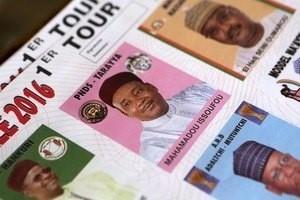Advertisement
Niger holds tense vote in which President Issoufou runs for second term
NIAMEY (Reuters) - Niger closed its borders and ramped up security on Sunday for an election in which President Mahamadou Issoufou is running for a second term with a promise to crush Islamist militants and develop one of the poorest countries in the world.
Security forces patrolled the main cities and villages in a bid to foil possible unrest or a potential plot by militants. In another sign of heightened security, the interior minister said the country's land borders would be closed. Some voters said they had never experienced such a tense election.
"Niger needs strong democratic institutions. I hope that the presidential and legislative elections will permit us to reinforce our institutions," Issoufou said when he cast his ballot at city hall in the capital Niamey.
He faces 14 candidates including Seyni Oumaru, leader of an opposition coalition. Critics say Issoufou has used political repression in the run-up to the vote, arresting opposition supporters and jailing opposition leader Hama Amadou over charges related to a baby-trafficking ring.
"These are not free and fair elections. We have one presidential candidate in prison who has not been able to campaign ... The president has manipulated the electorate and used repression," said Amadou Saidou when he voted.
The government says it respects the law and calls the charges politically motivated. Voting began at 8 a.m. local time (0700 GMT) and initial turnout was low.
Niger produces uranium and oil but is ranked last in the U.N.'s Human Development Index and has one of the world's highest fertility rates. The country ranks 114 out of 142 in the 2015 prosperity index run by the U.K.-based Legatum Institute.
Islamist militant group Boko Haram, which is based in neighbouring Nigeria, has staged a series of attacks in recent months, forcing authorities to declare a state of emergency in the southeastern region of Diffa.
Even so, Niger prides itself on being peaceful relative to its neighbours Nigeria, Libya and Mali.
Issoufou, who was born in 1951, won an election in 2011, a year after a coup. Under election rules, a run-off will be held if no candidate secures an outright victory on Sunday.
His challengers include Amadou, 2011 second-place finisher Oumaru and ex-president Mahamane Ousmane. Around 5,200 candidates also vie for 171 legislative seats on Sunday.
(Writing by Matthew Mpoke Bigg; Editing by Digby Lidstone)



















Add new comment